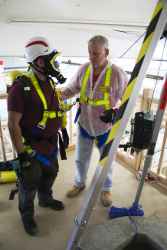
Posted to News on 11th Aug 2014, 12:16
Safe Systems of Work for confined spaces
Andy Richford, confined spaces and breathing apparatus specialist at PASS Training, contends that training for confined spaces needs to concentrate not only on Safe Systems of Work (SSoW) but also on self-rescue procedures and putting measures in place to avoid the need for having rescue teams placed on standby in the first place.

Everybody ignores the passenger safety training video when flying nowadays, don't they? It is a little like that with confined spaces training. Many people just cannot contemplate a worst-case scenario and so shut their minds to it.
Some industries routinely train their workers on using gas detection, the use of escape set breathing apparatus and the use of short duration working breathing apparatus. However, either too much emphasis is sometimes put on there being a rescue team on standby, or no thought-out emergency plan is put in place right from the start.
A simple, effective SSoW with a similar and relevant Emergency Plan covering "self-rescue' would often cover most entries adequately. It can be a simple, easy to plan, manage and therefore auditable way of operating in most cases. It does not need to be complex.
A training package should cover planning to enable workers to evacuate a Confined Space before things go wrong (the ability for the entrants to "self-rescue'). Should anything ever go wrong, the Health and Safety Executive (HSE) would need to consider in mitigation whether the employer has followed "best practice' so far as reasonably practicable.
If we look at many of the past Confined Space incidents and fatalities in the UK, we would see that the common factor has nothing to do with SSoW or rescue procedures, but in the fact that employers and workers do not know that they have a Confined Space in the first place until after subsequent investigation.
The Health and Safety Executive warns in its publication about confined spaces that poisonous gas, fumes or vapour can build up in sewers and manholes and in pits connected to the system, enter tanks or vessels from connecting pipes and leak into trenches and pits in contaminated land, such as old refuse tips and old gas works.
It is not possible to provide a comprehensive list of confined spaces. Some places may become confined spaces when work is carried out, or during their construction, fabrication or subsequent modification. Some confined spaces are fairly easy to identify, like enclosures with limited openings such as storage tanks, silos, reaction vessels, enclosed drains and sewers. Others may be less obvious, but can be equally dangerous, for example open-topped chambers, vats, combustion chambers in furnaces, ductwork and unventilated or poorly ventilated rooms.
Safety at all times
Training programmes should generally be structured so that they move from simple to more complex tasks and from lower to higher levels of risk depending upon the identified client requirement. Every year, people are injured or killed as a result of negligence or lack of knowledge in confined spaces. This is generally due to a failure of staff or responsible employers to understand the importance of confined spaces and/or a lack of equipment provided to ensure safety at all times.
Confined Spaces training is not just about sitting through lectures on the 1997 Confined Spaces Regulations, but also about physically trying out a real-life scenario in a purpose-built structure that replicates a typical environment, complete with rescue winches and breathing apparatus.
PASS holds specialist Confined Spaces and Breathing Apparatus training at its Northeast City & Guilds (C&G) approved location. It is an industry-wide confined spaces specialist for utilities and facilities management in commercial and industrial environments, including petrochemical, engineering and fabrication, local authorities, civil engineering and construction.
Every confined space could be designated with a risk level of low, medium and high. One-day awareness events can be delivered at customer locations, paving the way for more comprehensive training courses which may last up to three days, for example C&G 6150-53 for high-risk confined spaces.
For further information please visit the confined spaces page at PASS Training.
Want the latest machine building news straight to your inbox? Become a MachineBuilding member for free today >>
PASS (Portable Appliance Safety Services Ltd)
1 Wilson Street
Thornaby
TS17 7AR
UNITED KINGDOM
+44 (0)845 365 4050

















